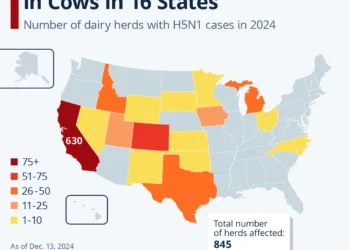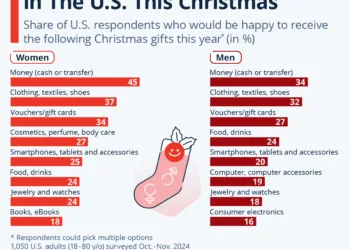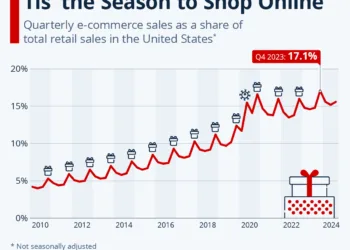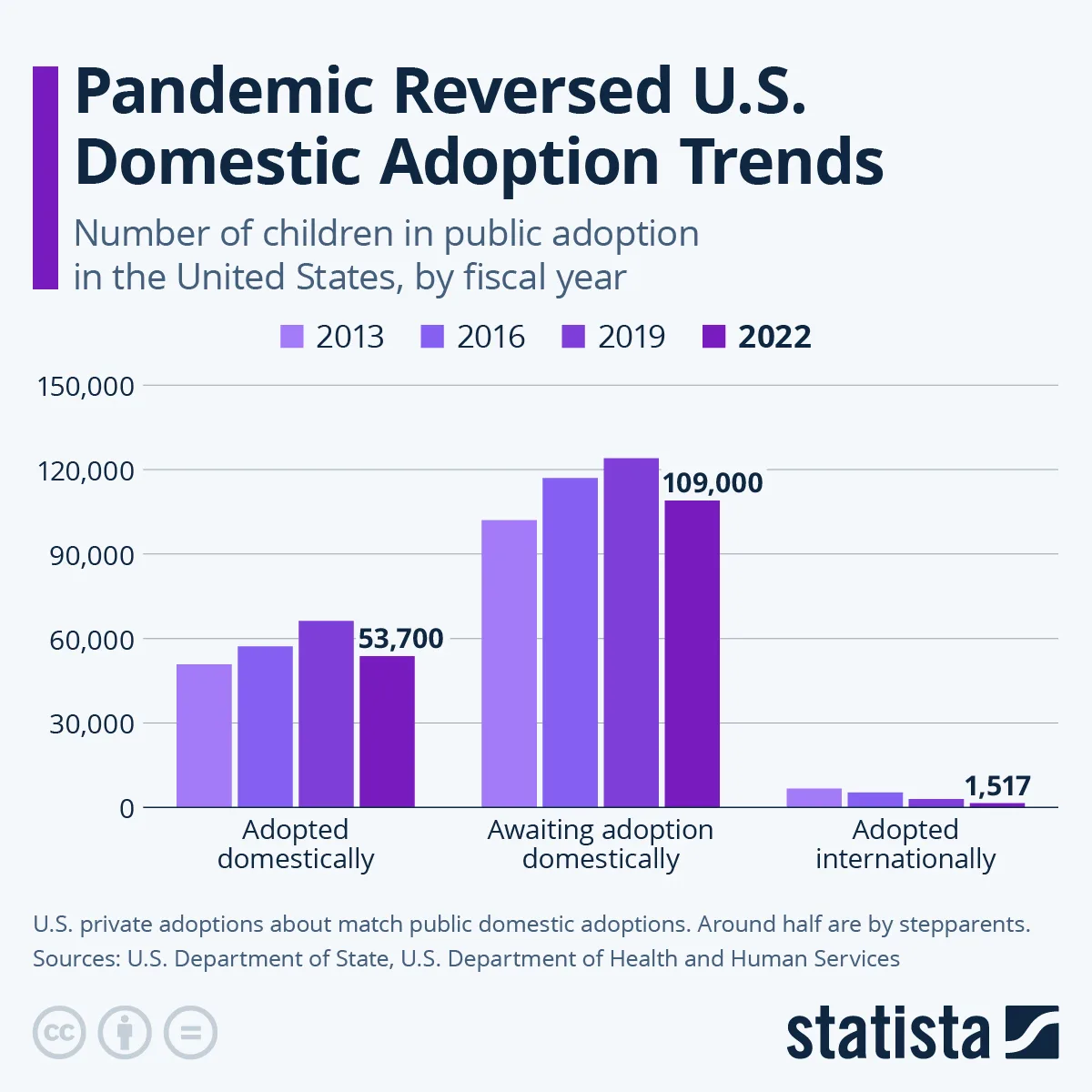Australian Opposition Leader Peter Dutton faces frequent criticism for allegedly adopting the strategies of former U.S. President Donald Trump. Many analysts have labeled Dutton a “populist,” suggesting he aims to gain political support by positioning average citizens against perceived corrupt “elites.”
This populist approach is reflected in the readiness of figures like Trump and Dutton to take jabs at “big business.” This tactic is somewhat surprising for conservative parties and has raised concerns among pro-business entities, including the Wall Street Journal and the Australian Financial Review.
Historically, both Republicans and Liberals have preferred to associate themselves more with small businesses than with large corporations. Their relationship with corporate interests has not always been straightforward.
Despite this, a consistent belief remains that there is not an inherent conflict between business operations and worker rights, and they often align with big business on crucial issues such as taxation and governmental regulations.
Dutton’s declaration earlier this year stating that the Liberal Party is “not the party of big business,” but rather “the friend of the worker,” represents a significant shift in rhetoric, even if the authenticity behind this claim is in question.
This shift mirrors a similar trend among leading Republicans. For example, Florida Senator Marco Rubio described a future Republican Party reliant on “a multiethnic, multiracial, working-class coalition” back in 2020.
To address recent electoral losses among highly educated middle-class voters and specific regions, both parties may find it necessary to broaden their appeal to the working class, with economic populism serving as a viable strategy.
But just how far can conservative parties lean into economic populism?
Thomas Slusser/The Tribune-Democrat/AP
Why Challenge Big Business?
Many of the Republican and Liberal parties’ criticisms of big businesses are fundamentally rooted in cultural issues rather than economic ones.
Publicly traded companies have increasingly adopted diversity, equity, and inclusion initiatives. They express commitments to sustainability and support various social causes, such as marriage equality and racial justice movements.
Regardless of how genuine these initiatives may be, many conservatives perceive large corporations as culturally antagonistic to their values. Furthermore, there is growing skepticism about big business and financial institutions as trustworthy political allies.

Biance de Marchi/AAP
Moreover, these parties feel less dependent on traditional corporate donors than in the past. The rise of private companies owned by wealthy individuals has shifted the financial support landscape for conservative parties.
Given these changes, both Republican and Liberal leaders have found it more feasible to target big business, which has never been a widely favored entity, as part of their populist campaigns.
Their criticisms often center around “wokeness,” but they also address consumer protection in light of the ongoing cost of living crisis in the U.S. and Australia.
For example, Trump has suggested capping credit card interest rates at 10%, while Dutton has pushed for government action to dismantle supermarket and hardware chains exploiting their market dominance.
The rationale behind these strategies is that voters often trust Republican and Liberal parties more than their opponents when it comes to economic management. Most Democratic and Labor politicians, however, tend to avoid extreme populist measures due to concerns over perceived fiscal irresponsibility.
However, when it comes to genuinely supporting workers over businesses, the perspective shifts considerably.
The Republican Strategy with ‘Union Workers’
During his presidency, Trump maintained a distinctly anti-union stance, as evidenced by his appointees to the National Labor Relations Board consistently ruling against union interests.
In his current campaign for the presidency, unions have criticized him for trying to appeal to “union workers” at non-unionized businesses, while also praising tech billionaire Elon Musk for laying off workers in unionized environments.
Trump has openly stated that he detested paying overtime and has previously indicated a preference for employing non-union labor.
Despite this, his campaign is actively courting unionized workers, especially those in key Midwestern states, where their votes could be pivotal.
While unions traditionally endorse Democratic candidates, many voters from union households also support Republican candidates, with some polls suggesting support exceeding 40% for Republicans.

Evan Vucci/AP
This year, Trump approached the International Brotherhood of Teamsters for their endorsement. The Teamsters, who have historically backed Democratic candidates, had earlier supported Republican leaders in the past.
Even though the Teamsters did not endorse either candidate this election cycle, internal polling indicated that nearly 60% of their members expressed support for Trump, while only a third favored Kamala Harris.
Modern Republicans, particularly during the Trump era, often highlight “union workers” while simultaneously attacking union leadership. For instance, Senators JD Vance and Josh Hawley supported the striking United Auto Workers but took issue with the union’s leaders.
Using the term “union workers” evokes a sense of nostalgia for a time when blue-collar labor was celebrated, reminiscent of the anti-communist sentiment and labor solidarity of the 1960s and 70s, where these workers were aligned with political conservatives.
This nostalgia not only appeals to feelings of stability associated with union jobs but also suggests the potential for a return to long-term employment in manufacturing sectors, jobs traditionally aligned with unions.
Where Liberals Stand Apart
While Dutton may extol the virtues of workers, he is unlikely to embrace the term “union” any time soon. The structure of Australia’s political parties makes it difficult for Liberal leaders to openly court unions, given the entrenched adversarial nature of industrial relations.
The Australian Labor Party originated from the union movement, with affiliated unions holding a significant influence in party conferences, a contrast to the looser ties between American unions and the Democratic Party.
Even though union voter support isn’t off-limits for other parties, the Liberal Party does not engage with these voters in the same manner as Republicans do.
Trump’s ambition of revitalizing American manufacturing would necessitate a resurgence in stable employment, closely associated with unions. In contrast, Australian Liberals favor more flexible labor arrangements.
Ultimately, many Australian Liberals prefer to view blue-collar workers as independent tradespeople rather than employees. Dutton frames the Liberal Party as friends of “small business owners and their employees,” evoking imagery of close-knit workplaces rather than larger, impersonal ones.

Nikki Short/AAP
Additionally, unlike Trump’s Republican Party, the Australian Liberal and National parties still advocate for free trade. In a shift from bipartisan opposition to protectionism, Labor has embraced a new industrial policy, something the Coalition does not support.
There are differing opinions about whether Trump truly embodies populism. Nevertheless, he has more latitude for authentically populist rhetoric than Dutton, at least for now.
Despite being a symbol of capitalist excess, part of Trump’s appeal is rooted in criticizing capitalism for veering off course—not just toward excessive political correctness, but also through globalization and financialization, where profit from speculation now outweighs that from actual production.
Ultimately, there are limits to how much a Liberal leader like Dutton can leverage public dissatisfaction with capitalism.










